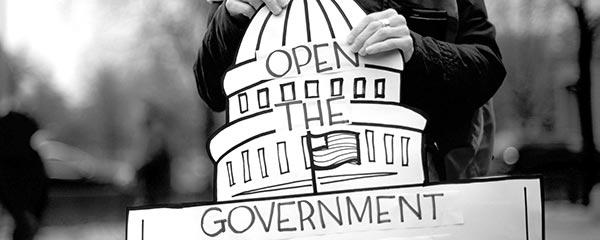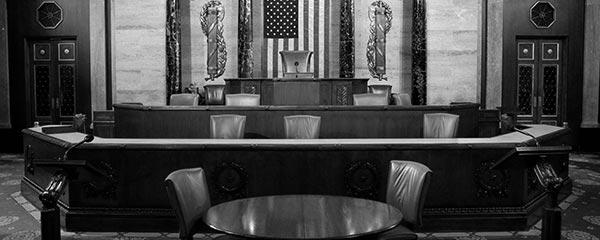Story Highlights
- 37% of Americans view GOP favorably, down from 45% in Sept.
- Favorable opinions of Democratic Party stable at 45%
- Americans say Democrats acted more responsibly than did Trump
WASHINGTON, D.C. -- As the longest government shutdown in U.S. history came to an end, Â鶹´«Ã½AV polling suggests that the Republican Party's image has suffered more than the Democratic Party's. The GOP's favorability rating fell to 37% from 45% in September. At the same time, Americans' favorable views of the Democratic Party remained stable at 45%. Still, opinions of the GOP are not as negative as they were during the October 2013 shutdown when only 28% viewed the party positively.

The results are based on a Jan. 21-27 Â鶹´«Ã½AV poll. The 35-day shutdown ended on Jan. 25, by which time roughly 70% of interviews were completed.
The prior 45% GOP favorable rating from September -- its best since 2010 -- coincided with Brett Kavanaugh's Supreme Court nomination hearings, which may have boosted the party's standing in the eyes of the public. Opinions of the Republican Party are now back to where they were in 2017 after GOP lawmakers failed to repeal the Affordable Care Act.
Since September, the largest decline in favorable ratings of the Republican Party has come among independents, from 41% to 29%. Republicans' ratings of the GOP are down six percentage points to 85%, while Democrats' opinions of the GOP are slightly more positive, from 6% favorable to 11%.
The Democratic Party's image did not appear to suffer amid the recent shutdown, which differs from the last shutdown in 2013 when the Democratic Party favorable rating slipped from 47% to 43%.
Americans also give higher marks to the Democrats than the Republicans when evaluating how each party's congressional delegation is performing. The poll finds 38% of Americans approve of the job Democrats in Congress are doing, compared with 31% who approve of the Republicans in Congress.
Democrats' more positive approval and favorable ratings likely relate to a separate finding in the poll, showing that Americans' believe the Democratic leaders in Congress acted more responsibly than did President Donald Trump, by 50% to 39%. In each of the last two major shutdowns, in 1995-1996 and in 2013, Americans tended to think the (Democratic) president acted more responsibly than the (Republican) leaders in Congress.
| % | ||||||||||||||||||||||||||||||||||||||||||||||||||||||||||||||||||||||||||||||||||||||||||||||||||||
|---|---|---|---|---|---|---|---|---|---|---|---|---|---|---|---|---|---|---|---|---|---|---|---|---|---|---|---|---|---|---|---|---|---|---|---|---|---|---|---|---|---|---|---|---|---|---|---|---|---|---|---|---|---|---|---|---|---|---|---|---|---|---|---|---|---|---|---|---|---|---|---|---|---|---|---|---|---|---|---|---|---|---|---|---|---|---|---|---|---|---|---|---|---|---|---|---|---|---|---|---|
| Jan. 21-27, 2019 | ||||||||||||||||||||||||||||||||||||||||||||||||||||||||||||||||||||||||||||||||||||||||||||||||||||
| President Trump | 39 | |||||||||||||||||||||||||||||||||||||||||||||||||||||||||||||||||||||||||||||||||||||||||||||||||||
| Democratic leaders in Congress | 50 | |||||||||||||||||||||||||||||||||||||||||||||||||||||||||||||||||||||||||||||||||||||||||||||||||||
| Oct. 2-3, 2013 | ||||||||||||||||||||||||||||||||||||||||||||||||||||||||||||||||||||||||||||||||||||||||||||||||||||
| President Obama | 40 | |||||||||||||||||||||||||||||||||||||||||||||||||||||||||||||||||||||||||||||||||||||||||||||||||||
| Republican leaders in Congress | 35 | |||||||||||||||||||||||||||||||||||||||||||||||||||||||||||||||||||||||||||||||||||||||||||||||||||
| Jan. 12-15, 1996 | ||||||||||||||||||||||||||||||||||||||||||||||||||||||||||||||||||||||||||||||||||||||||||||||||||||
| President Clinton | 45 | |||||||||||||||||||||||||||||||||||||||||||||||||||||||||||||||||||||||||||||||||||||||||||||||||||
| Republican leaders in Congress | 38 | |||||||||||||||||||||||||||||||||||||||||||||||||||||||||||||||||||||||||||||||||||||||||||||||||||
| Â鶹´«Ã½AV | ||||||||||||||||||||||||||||||||||||||||||||||||||||||||||||||||||||||||||||||||||||||||||||||||||||
However, another measure in the poll suggests that Democrats may not have emerged from the shutdown unscathed. A majority of Americans, 53%, now say they feel more negatively toward Democratic leaders in Congress. That compares with 61% feeling more negatively about Republican leaders and 63% about President Trump.
Likewise, during the 2013 shutdown, majorities of Americans also said they viewed the Democratic leaders in Congress (58%), Republican leaders in Congress (61%) and President Barack Obama (57%) more negatively.
Already Negative Ratings of Leaders Largely Unchanged
Opinions of the president and Congressional leaders were decidedly negative before the shutdown began and have changed little near the end of its 35-day run. All of the leaders have favorable ratings below 40%, and Trump, Speaker of the House Nancy Pelosi, and Senate Majority Leader Mitch McConnell have unfavorable ratings approaching or exceeding 50%. The lesser-known Minority Leaders -- Democrat Chuck Schumer in the Senate and Republican Kevin McCarthy in the House -- have unfavorable ratings roughly 10 points higher than their favorable ratings.
| Dec 3-12 | Jan 21-27 | ||||||||||||||||||||||||||||||||||||||||||||||||||||||||||||||||||||||||||||||||||||||||||||||||||
|---|---|---|---|---|---|---|---|---|---|---|---|---|---|---|---|---|---|---|---|---|---|---|---|---|---|---|---|---|---|---|---|---|---|---|---|---|---|---|---|---|---|---|---|---|---|---|---|---|---|---|---|---|---|---|---|---|---|---|---|---|---|---|---|---|---|---|---|---|---|---|---|---|---|---|---|---|---|---|---|---|---|---|---|---|---|---|---|---|---|---|---|---|---|---|---|---|---|---|---|
| % Favorable | % Unfavorable | % Favorable | % Unfavorable | ||||||||||||||||||||||||||||||||||||||||||||||||||||||||||||||||||||||||||||||||||||||||||||||||
| Donald Trump | 40 | 58 | 39 | 59 | |||||||||||||||||||||||||||||||||||||||||||||||||||||||||||||||||||||||||||||||||||||||||||||||
| Nancy Pelosi | 38 | 48 | 38 | 52 | |||||||||||||||||||||||||||||||||||||||||||||||||||||||||||||||||||||||||||||||||||||||||||||||
| Mitch McConnell | 30 | 48 | 29 | 49 | |||||||||||||||||||||||||||||||||||||||||||||||||||||||||||||||||||||||||||||||||||||||||||||||
| Chuck Schumer | 32 | 40 | 33 | 42 | |||||||||||||||||||||||||||||||||||||||||||||||||||||||||||||||||||||||||||||||||||||||||||||||
| Kevin McCarthy | n/a | n/a | 25 | 35 | |||||||||||||||||||||||||||||||||||||||||||||||||||||||||||||||||||||||||||||||||||||||||||||||
| Â鶹´«Ã½AV | |||||||||||||||||||||||||||||||||||||||||||||||||||||||||||||||||||||||||||||||||||||||||||||||||||
Similar to his favorable ratings, Trump's already low job approval appears to have been affected little by the government shutdown. Thirty-seven percent of Americans approved of the job he was doing in two separate Â鶹´«Ã½AV polls conducted during the shutdown (Jan. 2-10 and Jan. 21-27). The final pre-shutdown reading for Trump, from Dec. 17-22, was 39%.
As such, his approval rating among subgroups is also largely flat. This includes his rating among Hispanics, whose approval rating of Trump averaged 20% in Â鶹´«Ã½AV's two January polls. That is similar to Hispanics' 25% approval rating of Trump in December 2019, suggesting the shutdown and related debate over border security is not improving Hispanics' view of him. Trump has touted a recent poll result by another survey organization showing a 50% approval rating for him among the group, based on a smaller sample of Hispanics interviewed in English only.
Four in 10 Described Shutdown as Crisis for U.S.
Americans were more inclined to describe the recent shutdown as a "crisis" for the U.S. than they were the two other recent lengthy shutdowns. Forty-one percent of Americans described the government shutdown as a crisis, compared with 21% who said the same about the 2013 shutdown and 12% about the 1995-1996 shutdown. The 1995 and 2013 polls were taken at the beginning rather than the end of the shutdown, and the timing of each may account for the difference in attitudes.
Shutdown effects were not widespread, but still likely affected millions of Americans. Sixteen percent said they were not able to obtain a government service they needed, 14% said a family members' business or employer was affected negatively by loss of business from the government or government workers, 11% were not able to visit a national park or museum they wanted to and 3% said they or a family member could not work or were not paid for work.
All told, 30% of U.S adults reported being affected by the shutdown in at least one of those ways.
Implications
With the government now re-opened, Washington leaders will attempt to negotiate an end to the budget shutdown, which is mostly centered on funding for Trump's desired border wall between the U.S. and Mexico. The Democrats appeared to have the upper hand in terms of public opinion in the recent battle, and it is unclear how Trump and the Republicans might swing it in their favor. As such, it may be in the best interests of Trump and Republicans to strike a deal with Democrats, rather than hold out for their most favored outcome, to avoid another shutdown after the current budget extension expires on Feb. 15.
Explore President Trump's approval ratings and compare them with those of past presidents in the Â鶹´«Ã½AV Presidential Job Approval Center.
View complete question responses and trends.
Learn more about how the works.




